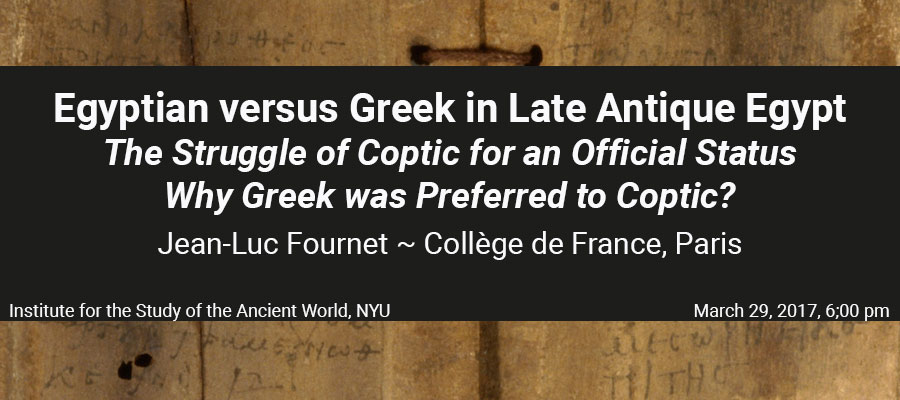Egyptian versus Greek in Late Antique Egypt: The Struggle of Coptic for an Official Status, II: Why Greek was Preferred to Coptic?, lecture by Jean-Luc Fournet (Collège de France, Paris), ISAW-NYU, March 29, 2017, 6:00 pm
During the first three centuries of its history, Coptic, the final stage of the Egyptian language written with Greek letters, was only used for literary purposes and private correspondence but not for contracts between individuals, documents sent by individuals to the authorities, or internal administrative communication—areas in which the Greek language had a monopoly. This situation is unique in comparison with what is observed in other provinces of the Roman Empire and cannot be explained by a legal prohibition.
This lecture will outline several possible reasons for the late development of official Coptic. Possible reasons include the nature of the language itself, the prestige enjoyed by the Greek language, the milieu of Coptic’s creation, and the longstanding distrust of the Greek-speaking State towards the legal use of Egyptian.
Jean-Luc Fournet is a papyrologist and a specialist in late antiquity. In March 2015, he was appointed professor at the Collège de France (Paris), which created for him its first chair of papyrology named “Written Culture in Late Antiquity and Byzantine Papyrology.” Prior to his current position, he was a scientific member of the Institut Français d’Archéologie Orientale in Cairo (1992-1996), researcher at the CNRS in Strasbourg (1996-2004), and professor at the École Pratique des Hautes Études (Department of Historical and Philological Sciences) in Paris (2004-2015). He devotes much of his scholarly activity to editing new texts, including papyri and Greek inscriptions on late antique amphorae, which he was the first to decipher, and has a special interest in the culture of late antiquity—particularly poetry, multilingualism, and modalities of written culture.
This lecture is the second of four on Egyptian versus Greek in Late Antique Egypt in the Rostovtzeff Lecture Series.
RSVP required
